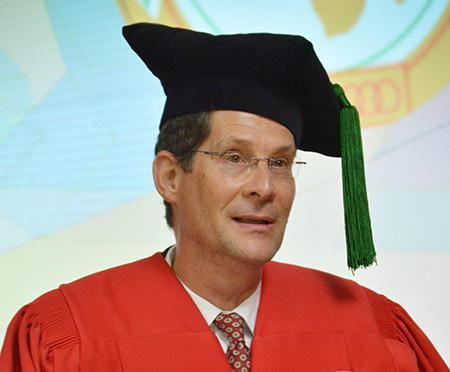This course was hosted by the focus area in partnership with the International Institute of Ageing, United Nations, Malta, the International Longevity Centre SA, the South African Gerontological Association and the National Department of Social Development.
Prof Hoffman is a professor of socio-gerontology in Optentia’s Ageing and Generational Dynamics in Africa (AGenDA) subprogramme on the North-West University’s (NWU’s) campus in Vanderbijlpark. He is also a James Martin senior research fellow at the Oxford Institute for Population Ageing at Oxford University in the UK.
His research shows that even though the African continent has one of the youngest populations in the world, the next 30 years will bring a growth of almost 300% in citizens over the age of 60 years.
According to Prof Hoffman this dramatic increase in the number of older people in Africa is primarily driven by three factors. They are longevity, a decline in fertility and migration.
Due to advances in medical technology and changes in modern lifestyle, people tend to live longer today than they did 30 years ago. In the next 30 years life expectancy will increase even more. “The ideal would be a healthy longevity,” says Prof Hoffman, “but the reality is that older age often comes with health challenges and other problems.”
Economic and social factors all contribute to a drastic decline in fertility. Prof Hoffman argues that the combination of declining fertility and longer life expectancy is what drives the aging of the population.
The third driving force behind the aging population of the continent is migration: the trend of younger members of families leaving rural areas in search of employment in the cities. Migration robs communities not only of their younger, more educated community members, but also of those persons who are supposed to care for the older members of society and therefore breaking the chain of care. Families also lose their networks, since the connection to care and services leaves with the person who supplied them to the family.
South Africa currently boasts a heterogeneous population of 56 million people or which 8,2% (4,1 million) are over the age of 60. It remains one of the most unequal societies in the world with an ever-increasing gap between rich and poor and a high level of illiteracy among older people (42,9% of older people did not undergo any formal schooling). Unemployment levels are soaring and 41% of South Africans live in extreme poverty.
Against this background, it is Prof Hoffman’s concern that longevity will become the new inequality. Longevity, if it is achieved, entails a life of compromised health due to poverty. Prof Hoffman argues that it is time for policy makers, government and role players to invest in skills and put measures in place now to enable older people to contribute to society for longer. “It is up to our generation to ensure that we add life to the years of older people.”

The AGenDA subprogramme, under the leadership of Prof Jaco Hoffman, recently hosted two very unique events to bring government and policy makers together.
